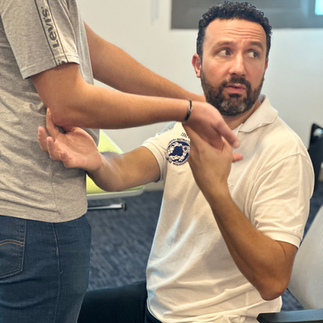Dates & Location
Next Course: Abu Dhabi | Part 1: Oct 23-27, 2024 | Part 2: Dec 11-15, 2024 | Part 3: Apr 23-27, 2025
Course Overview
“The Bobath Concept is an inclusive, individualized therapeutic approach to optimize movement recovery and potential for persons with neurological pathophysiology informed by contemporary movement and neurosciences. The concept provides a framework for the analysis of functional movement based on the understanding that neurological pathology affects the whole person. Intervention focuses on the recovery of typical movement, minimizing atypical and compensatory movement, whilst recognizing that movement problems are influenced by the person’s lived experiences pre and post the neurological lesion. There is an emphasis on a 24-hour multidisciplinary approach to enhance activity and participation.
Within the Bobath concept, functional movement analysis considers the influence of sensory information on the relative interaction of postural control, selective movement and cognitive/perceptual processes. Likewise, trunk and head control is viewed as equally important as upper and lower limb control. The quality of movement performance is considered with respect to the integration of postural control and selective movement, the active alignment of all body segments, and the ability to receive, integrate and respond to sensory information. Facilitation is a Bobath clinical skill and is an active process that seeks to influence sensory information through therapeutic handling, environmental and verbal cues. The client’s response to facilitation informs the clinical reasoning process”.

Course Instructor

KOSTAS KYPRIOTIS PT, MSc
Bobath (IBITA) Instructor &
IMTT Senior Tutor
Graduate of the physiotherapy department of the technological institute of Athens, Greece in 2003. He has been awarded with master’s degrees with distinction in the fields of neurorehabilitation (MSc Neurorehabilitation, Brunel university of London, UK) and metabolic bone disorders (MSc mbd, school of Medicine, university of Athens, Greece), in 2005 and 2011 respectively. He has received training in concepts such as Bobath, IMTT® myofascial treatment, PNF, Maitland Orthopedic manual therapy, customized orthotics, neurodynamics, acupuncture, fascial manipulation, Fascia distortion model, explain pain, and kinematic taping. He is a certified Bobath instructor of the international Bobath instructors teaching association (IBITA). IBITA is an international educational association, which delivers clinical education regarding The Bobath concept. The Bobath concept utilizes treatment principles, methods and techniques for the Treatment of patients with neurological disorders, based on current neuroscience knowledge. In parallel, he has a special interest for the role of myofascial system in terms of motor control and
Movement dysfunction. He is a senior instructor of the interessengemeinschaft für myofasziale Triggerpunkt-therapie (IMTT®). IMTT® (imtt.ch) is a Swiss based educational association providing clinical Education to physiotherapists and doctors regarding the assessment and treatment of myofascial Dysfunction (muscle, fascia, dry needling). Kostas is working in his private practice in Athens, Greece. He is treating adults with neurological or Musculoskeletal disorders.
Learning Objectives
1. Understand the history and ongoing development of the Bobath concept.
2. Be able to integrate the principles of the international classification of functioning,
Disability and health (ICF) in their evaluation and treatment of adults with
Neurological conditions.
3. Analyze and facilitate efficient postural and movement control in preparation for and
During functional activity.
4. Understand the functional consequences of lesions of the central nervous system
5. Observe and analyze dysynergic and/or inefficient movement and function, and influence
This through intervention.
6. Utilize the principles of motor control, motor learning, neural plasticity and muscle
Plasticity in their approach to treatment.
7. Understand the relationship between assessment and treatment, and implement the
Ongoing process of clinical reasoning.
8. Adapt and apply appropriate theoretical principles of treatment to the individual
Patient/client within his environment.
9. Develop effective handling skills and incorporate them with appropriate
Environmental and other influences in order to regain function.
10. Appreciate the importance of appropriate outcome measures to support evidence-based
Practice.
11. Continue learning through critical reading, self-evaluation and sharing with others.



















